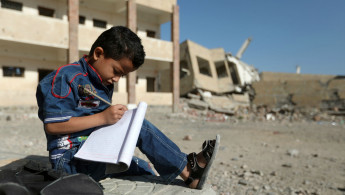Yemen's students face another uncertain new school year
"The teachers did not show up. The students arrived in their classrooms on time as every year. But who will teach us?"
Yemen's public sector workers, including school teachers, have not received their salaries for a year. Today, the students in Yemen are worried that this school year will begin and end with them coming and going, to and from school without any benefit.
Though the school year was set to begin in September, it was repeatedly delayed while officials and communities searched for a solution in order to pay teachers' salaries.
For Ali, who is a high school student in Sanaa, the beginning of this school year is disappointing.
"This situation makes me sad. When I wake up in the morning, I feel happy and enthusiastic to begin my school day. I arrive at the school, and I begin to lose spirit as I see no teachers," said Ali.
There are some 166,000 school teachers in Yemen. They are the bread-winners for thousands of families. Denying them their salaries hurts thousands of households across the country.
While this tragedy continues to unfold in Yemen, the UN has not been silent.
Geert Cappelaere, UNICEF regional director for the Middle East and North Africa, warned that the two-and-a-half-year conflict has put the education of 4.5 million children on the line.
"UNICEF calls on all parties across Yemen to protect schools, refrain from using schools for military purposes and work together to find an urgent solution to the salary crisis so that children can learn," said Cappelaere.
Dreaming of private education
Ali understands the plight of public schools. She dreams of going to private school ust so she can go to classes like normal. Her parents laughed at the suggestion, she remembers.
"They told me 'we struggle to make money for food and rent, and you want us to enroll you in a private school'," said Ali.
Ali has given up trying to convince her family. She said she will self-study if teachers continue to be on strike - so that she might yet get a high score in her final examinations.
 |
Teachers will not suffer alone. The whole country will suffer if education is intentionally neglected. This negligence will negatively affect the generations to come |  |
"I am in my final year at the school. I want to obtain a high average so that I can enter the Faculty of Languages at Sanaa University. I want to major in English-Arabic translation," Ali said.
Arwa Mohammed, a school teacher in Sanaa, said she is fed up waiting for her salary, saying that teachers cannot continue teaching without an income to feed their families and themselves.
 |
|
| [Click to enlarge] |
"We understand that Yemen's economic situation is tough, seeing the war and the blockade," she told The New Arab. "And those responsible should realise that this job is the sole source of income for thousands of teachers. It would not be fair to work unpaid for numerous months while our families have no food."
Mohammed is angry at Yemen's warring parties, saying that education is being ignored. "No party cares about teachers or education. Teachers will not suffer alone. The whole country will suffer if education is intentionally neglected. This negligence will negatively affect the generations to come."
The Sanaa-based government said in early October that teachers would receive half their salary at the beginning of the school year. In their October meeting, the prime minister and education minister said salaries of teachers would be among their priorities. But it remains unclear if this move will be sufficient to resolve this crisis permanently.
"We hope this half salary will be paid monthly. It will help us cover at least some basic living expenses," said Mohammed.
'The school cannot feed me'
Abdulrahman Ahmed, 17, left school last year. If he continues his education, he would be a tenth-grader now. When the last year ended, he began working on a motorbike to help support his eight-member family in Sanaa.
This school year has started, but it does not matter to Ahmed. "I love my school. But this love disappears the moment I see my family in need of bread and water. I feel really honoured to help make my parents delighted in this life."
 |
Some of my friends go head to school in the morning, and I go to work on the bike. Better to work and feed my self than to go to the classroom hungry |  |
According to UN reports, 20 million Yemenis are need of humanitarian aid. With the war raging, the humanitarian catastrophe is deepening and the number of needy is rising.
"Some of my friends go head to school in the morning, and I go to work on the bike. Better to work and feed my self than to go to the classroom hungry," said Ahmed.
Nowadays, Ahmed makes YR1000 (about $3) every day. He spends this money to meet some family expenses. "I stopped going to the school because I was sure I would not be able to continue until I graduate," said Ahmed.
Unlike Ahmed, Ali is ambitious that she will complete her education and eventually gain a university degree.
"My target is clear," said Ali. "And this war will not be able to stop me."
Khalid Al-Karimi is a freelance reporter and translator. He is a staff member of the Sanaa-based Yemeni Media Center and previously worked as a full-time editor and reporter for the Yemen Times newspaper.
Follow him on Twitter: @Khalidkarimi205



